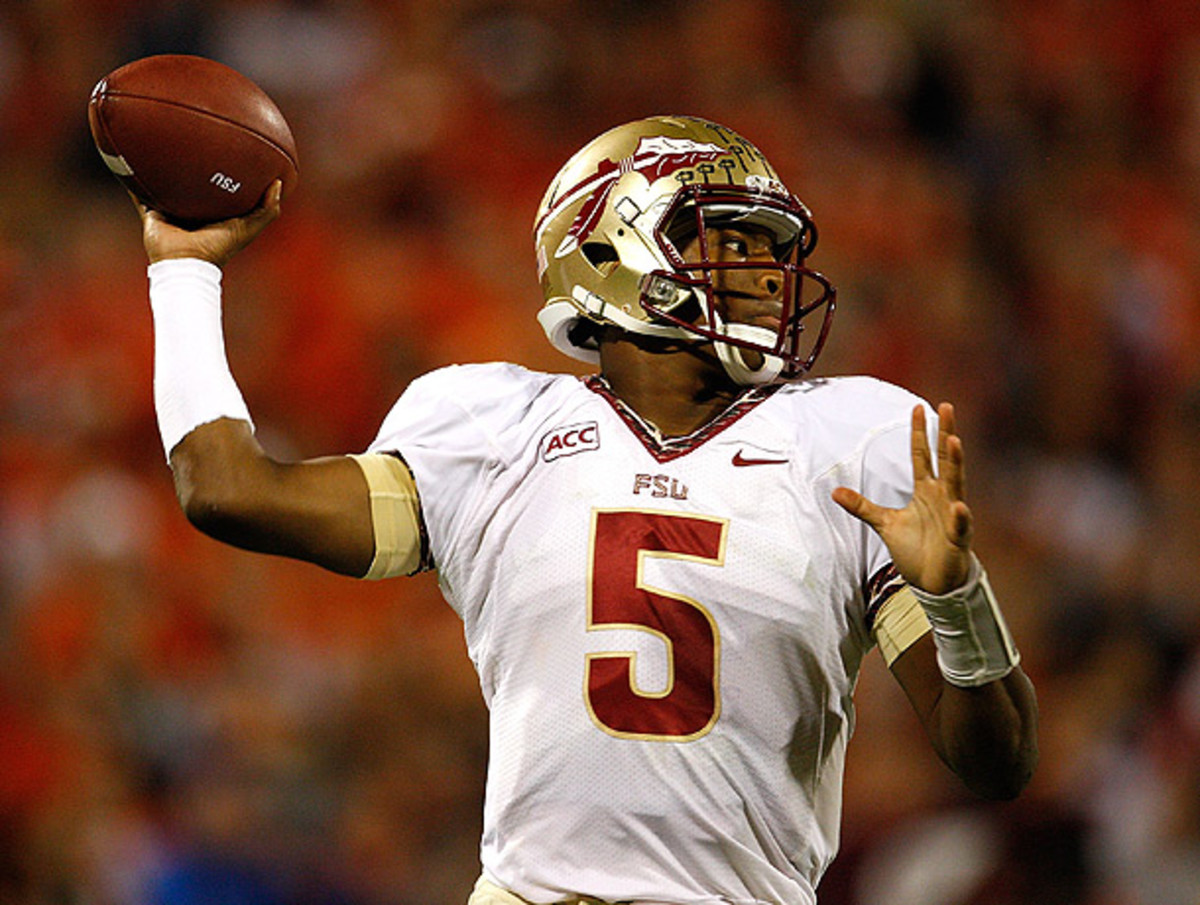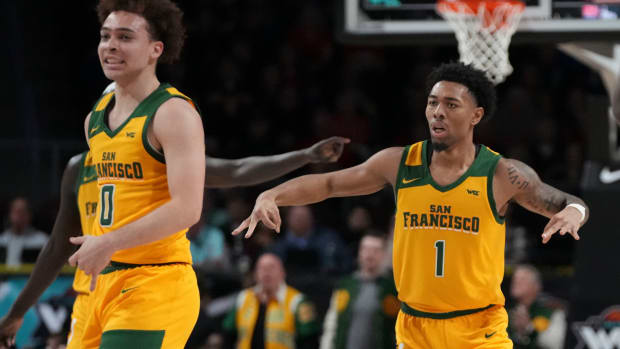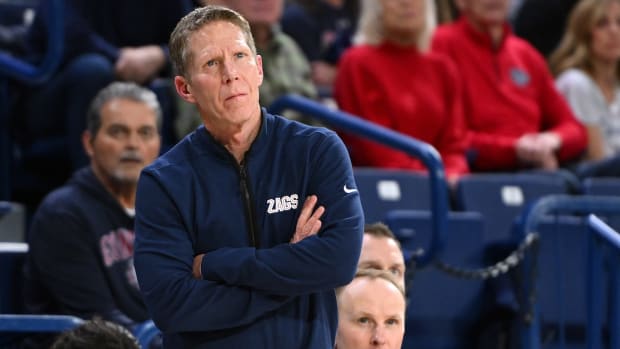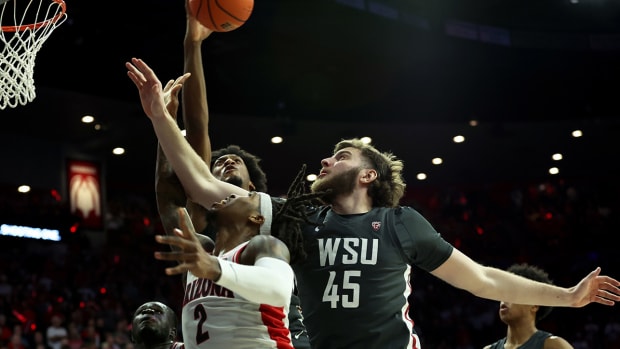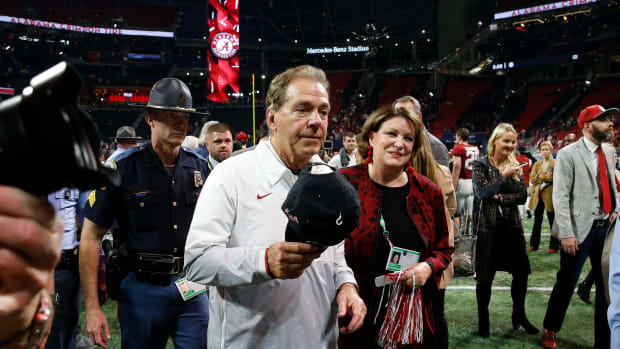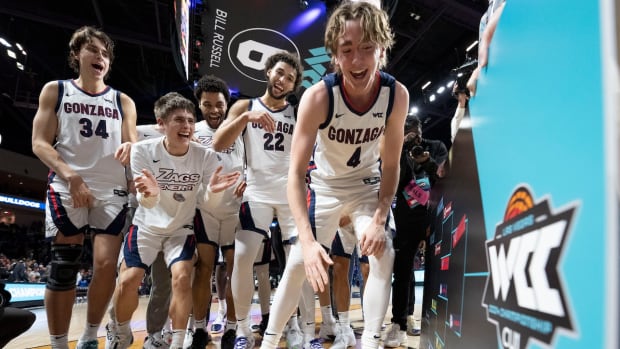The Read-Option: College football's burgeoning youth movement
Jameis Winston has lived up to the considerable expectations placed on him before the season began. (Tyler Smith/Getty Images)
All of college football watched as Jameis Winston picked apart Clemson in Florida State's win over the Tigers last weekend. But even the most avid followers of the sport have been shocked at the poise of Winston, who is only a redshirt freshman. The rise of Winston and many other youngsters represents a recent trend in college football, where first-year players are seemingly making an impact on the field earlier than in years past.
So why is this happening? Is there a reason that freshmen are having more of an effect on college football? What are the advantages and disadvantages of playing as a freshman, and is this good for the college game?
Zac Ellis and Martin Rickman discuss the topic in this week's Read-Option.
Martin Rickman: There's a growing trend in college football, and quite frankly I'm enjoying the heck out of it. More and more teams seem to be using young players than ever before, and it's giving us the joy of getting more Jameis Winstons and Myles Jacks and Tyler Boyds. What are you seeing? Are you as happy as I am?
Zac Ellis: Absolutely. I personally think that's one of the greatest aspects of college football, the chance for fresh new faces to come in and just dominate the game. We're seeing examples of this with guys like Winston. First, there seem to be high school prospects entering the college game more physically talented than in years past, and second, coaches aren't afraid to defer to those players in position battles during camp. Being a upperclassman doesn't guarantee anybody a starting gig with these hot-shot youngsters impressing the country.
STAPLES: Winston and Florida State look dominant in rout of Clemson
MR: Let's start with that first thing you said. Is this a testament to high school coaches? Are they running more complex schemes and stepping it up on the strength and conditioning side of things?
ZE: I think the growth of the nation's best high school programs has coincided with the growth and popularity of college football as a whole. As high schools recognize the kind of athletes that make it to the next level, I think you're right that prep programs are trying to make their teams more college football-oriented in strength training and play-calling. I also think the relative boom in recruiting coverage in the media plays a part in this, too. Nowadays you see kids as early as middle school getting evaluated by recruiting sites, and by the time they're juniors and seniors, these prospects are well-known by most college programs and fans alike. So if you're a recruit that's been hyped for four or five years before entering college, I think that plays into the potential of you seeing the field earlier than kids did in the past. You hear players from years ago talk about how recruiting is totally different now than it was then, and that's because there's such an emphasis placed on it now.
MR: So in a way coaches just know more about their players than they used to. They're more invested. Before you'd see a kid get kind of buried on the depth chart behind those upperclassmen because he had to "pay his dues" and '"learn the playbook." But coaches are learning now that they might be missing out on 25 percent of a player's career (in the event they don't redshirt a guy) and more wins if they don't play their young hyped recruits. If you have them, play them. Are there any disadvantages to playing freshmen?
ZE: There are definitely a few. With the exception of some of the major high school programs in the country, often times prep players who reach college were dominating ordinary high school opponents for most of their careers. So going from that situation to playing against comparative college athletes can be a huge shock to a freshman, one who might not appreciate the gravity of a situation. Plus, from a coach's perspective, you risk playing a freshman who isn't ready in front of a junior or senior who might know the system better. What do you think are the advantages?
MR: The sheer fact that these kids are hungry. They are going against those juniors and seniors every day in practice and they're not expected to make an impact. So they're going to work to prove they belong. Plus there's the unknown factor. We're so ingrained now to study every angle of the game, and technology allows advance scouting to play a bigger role than ever before. You know a guy's tendencies, their tells, how they like to run, what their technique is. When it comes to a freshman, there isn't a book on these guys. There's little to no film. They're a mystery. Just look at Pittsburgh facing Winston in his first game. Sure, they knew he was good and a five-star recruit, but they weren't ready for what he was able to bring. I know there are risks involved, but it's about trusting your recruiters and the players on your team. You have to let the cream rise to the top and give those guys a chance. Have a firm grasp of what's going on in your program. When you're merely playing freshmen because you're faced with injuries (cough cough Florida), that's the wrong time. If you can plug guys in because they really can play, you give your team a really nice boost.
ZE: And that's why I think this trend won't go away anytime soon. Just look at the last two seasons. Johnny Manziel became the first freshman to win the Heisman last season, and Winston is right up there in that same conversation. Manziel's situation, in particular, is interesting because he almost went to Oregon, where he likely would have sat behind Marcus Mariota on the depth chart and we might never have known Johnny Football. Coaches see these examples and wonder what hidden gems are hiding on their own benches, or in their own recruiting classes. If the Manziels and Winstons of the college football world weren't putting the sport on notice, we might not see as many big-time recruits getting shots on the field this early. But all in all, I think it has to be good for football because fresh, talented prospects coming on campus every year are going to make the veterans on a team work that much hard for playing time. What do you think?
MR: That's the best part of college football. Every year these freshmen are out there, and some are expected to perform, and others are completely random and amazing. Then we set them free into the world and watch them grow, and we welcome new college football babies into our lives. It isn't even Manziel who set this trend. Heck, Robert Griffin III made his way into Baylor's first game against Wake Forest and never looked back (injuries excluded). Sure, we see the big-time quarterbacks making a difference, but I'm even more excited about the skill players and the defensive guys. This is good for everyone. The players who get game experience earlier, the coaches who get more depth and experience even if there are growing pains, the fans who get new stars and sports crushes sooner than usual, and the NFL, which is able to get a more thorough scouting report on a guy with a deeper look.
ZE:
